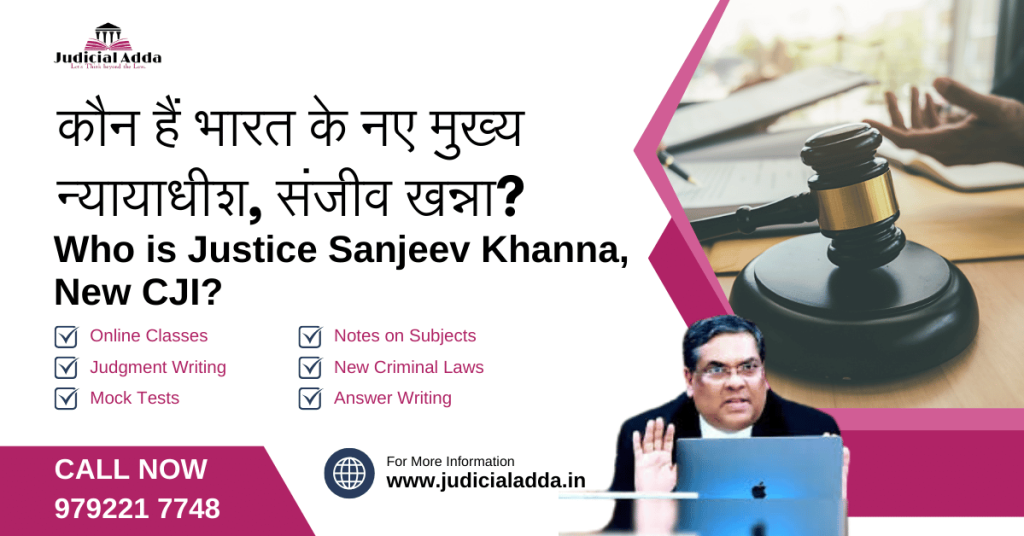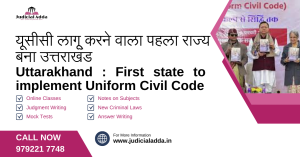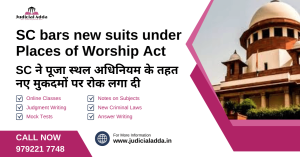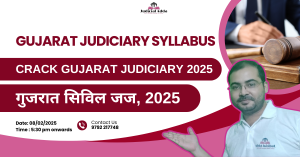
On Monday, November 11, 2024, President Draupadi Murmu administered the oath of office to Justice Sanjiv Khanna as the Chief Justice of India at Rashtrapati Bhavan. The ceremony was attended by the Chief Justice of India, the President, the Vice-President, Prime Minister Narendra Modi, government ministers, former Chief Justices of India, and both sitting and retired judges of the Supreme Court and High Court.
Justice Khanna replaces Justice D.Y. Chandrachud, who retired on November 10, 2024, and his tenure will extend until May 13, 2025.
The Process for the Appointment of the New CJI
The appointment of the Chief Justice of India adheres to a clearly established procedure as outlined in the Indian Constitution. Article 124 of the Constitution regulates the appointment of the Chief Justice of India and the other justices of the Supreme Court. The Constitution mandates that the President of India appoints the Chief Justice following consultations with other Supreme Court judges as deemed essential by the President. Over the years, the method has evolved considerably and now adheres to a system known as the “Collegium System.”
The Collegium System
The Collegium is a judicial appointment system comprising the senior-most judges of the Supreme Court, including the Chief Justice. The Collegium proposes candidates for judicial appointments, including the Chief Justice, and the President generally adheres to these recommendations. The Collegium, in its present form, consists of the Chief Justice of India and the four most senior judges of the Supreme Court. This method has faced criticism, prompting demands for enhanced transparency and accountability in judicial nominations.
Upon the anticipated retirement of the present Chief Justice D.Y. Chandrachud in November 2024, the President of India will officially appoint his successor. The most probable candidate for this seat, based on seniority, is Justice S.K. Khanna, the current most senior judge of the Supreme Court.
According to the Constitution of India. The Chief Justice retires upon reaching the age of 65 years unless removed from position; hence, if Justice Sanjiv Khanna ascends to the role of CJI, he will retire in May 2025. He may receive a tenure of approximately six months.
Criteria for Selection
Although the Constitution does not lay down specific criteria for the selection of a Chief Justice, seniority has been the predominant factor historically. The next in line after CJI Chandrachud, Justice Sanjiv Khanna, has vast experience as a judge and has delivered several important judgments in key areas like constitutional law, human rights, and environmental issues. His tenure as Chief Justice would, therefore, be expected to continue the focus on constitutional integrity, judicial reforms, and safeguarding civil liberties.
However, there is always room for discussion within the Collegium, and while seniority is a guiding principle, it is not an absolute requirement. The Collegium takes into account other factors, such as the candidate’s overall contribution to jurisprudence, legal integrity, and commitment to the Constitution.
Check this also
| AMU Minority Status | Supreme Court stops illegal Bulldozer demolitions |
| SC Upholds the Validity of UP Madarsa Education Act | Profession of an Advocate is Sui Generis and distinct from other Professions |
Challenges for the New CJI
The incoming Chief Justice of India will face a range of challenges, many of which will require both judicial acumen and leadership skills. Some of the key challenges include:
Case Backlog: One of the most persistent challenges facing the Supreme Court is the massive backlog of cases. The new CJI will need to work on mechanisms to reduce the time taken to adjudicate cases, possibly by increasing the number of working days and deploying technology more efficiently in court proceedings.
Judicial Independence: As the highest judicial officer in the country, the new CJI must ensure that the judiciary remains free from external influence and pressures. Ensuring that the judiciary functions independently and transparently is key to maintaining the public’s trust in the legal system.
Gender Equality and Inclusivity: The new Chief Justice will be expected to continue the efforts to promote gender equality within the judiciary. There remains a need for greater representation of women in the higher judiciary, and the CJI could play a significant role in addressing this disparity.
Expanding Legal Access: Another priority will be to ensure that access to justice is widened, especially for marginalized sections of society. Increasing the reach of legal aid services and ensuring that justice is not delayed or denied due to bureaucratic hurdles will be important goals.
Major decisions by Justice Khanna
Chief Justice Khanna, in his decision to grant former Delhi Chief Minister Arvind Kejriwal interim bail, had termed personal liberty a sacrosanct right on finding that the latter had been incarcerated for over 90 days in the liquor policy case.
J Khanna had also asked a larger bench to decide bail conditions that could be applied in cased similar to Mr. Kejriwal’s, when the sitting CM, in an unprecedented move by the Central Agencies, was arrested and remanded on money-laundering charges.
One another judgment of Justice Khanna, who had sat in over 450 Benches in the apex court, was his verdict giving the thumbs-up to EVMs while declining to revive paper ballots. In the past five years of sitting in the supreme court, Justice Khanna experience on the Bench has varied, he was part of the Bench headed by then Chief Justice Gogoi that heard on Saturday, April 20, 2019, Sexual Harassment Allegations levelled by the former Supreme Court staffer against the Chief Justice. His court refused to intervene in a case against the elevation of Madras High Court Judge, Justice Lekshmana Chandra Victoria Gowri.
Background of Justice Khanna
Justice Sanjiv Khanna, born on May 14, 1960, originates from New Delhi. His father, Justice Dev Raj Khanna, retired as a judge of the Delhi High Court, while his mother, Mrs. Saroj Khanna, served as a Hindi lecturer at Lady Shri Ram College, Delhi University. Justice Sanjiv Khanna began his schooling at Modern School in New Delhi in 1977 and thereafter graduated from St Stephen’s College, University of Delhi. After completing his postgraduate studies, Justice Sanjiv Khanna pursued a law degree at the Campus Law Centre (CLC) inside the Faculty of Law, University of Delhi.
He served as a senior standing counsel for the Income Tax Department and the National Capital Territory of Delhi. He served as Additional Public Prosecutor and amicus curiae at the High Court.
He was appointed as an Additional Judge of the Delhi High Court in 2005 and became a Permanent Judge in 2006. He was among the rare justices appointed to the Supreme Court directly from his respective High Court. He had never served as Chief Justice of a State High Court. He had surpassed 32 High Court judges in seniority to be nominated as a judge of the top court. Subsequently, Justice Khanna was appointed as a Supreme Court Judge on January 18, 2019.
Justice Sanjiv Khanna recently served on a two-judge bench alongside Justice Dipankar Datta, which granted temporary bail to Delhi Chief Minister Arvind Kejriwal, who had been incarcerated for over 50 days in connection with the Delhi Excise Policy Case. Additionally, Justice Khanna issued a ruling rejecting the petition for cross-verification of votes in EVMs with VVPAT. Justice Sanjiv Khanna has participated in numerous instances addressed by the five-judge constitutional bench led by Chief Justice DY Chandrachud.







